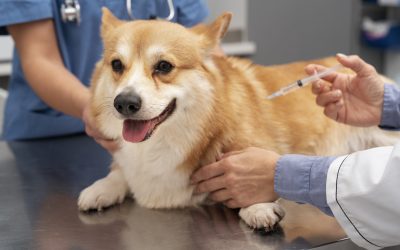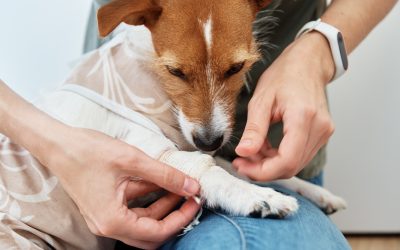Colitis in Dogs [Causes, Symptoms & Treatment]

What is colitis in dogs?
Colitis in dogs is a condition characterized by inflammation of the colon, which is the large intestine. This inflammation can cause various digestive symptoms and discomfort for our furry friends. Colitis can be acute or chronic, and dog owners must understand the causes, symptoms, and available treatment options.
Causes of colitis in dogs
There are several potential causes of colitis in dogs. One common cause is dietary indiscretion when dogs consume something they shouldn’t, such as spoiled food or garbage. This can lead to an upset stomach and inflammation of the colon. Other causes include food allergies or sensitivities, bacterial or viral infections, parasites, and certain medications. Stress can also contribute to the development of colitis in dogs, as it can disrupt the normal functioning of the digestive system.
Symptoms of colitis in dogs
The symptoms of colitis in dogs can vary, but common signs include diarrhea, often with mucus or blood, frequent defecation, straining to defecate, and urgency to go outside. Dogs with colitis may also experience abdominal pain, loss of appetite, weight loss, and dehydration. These symptoms can also be indicative of other gastrointestinal conditions, so it is crucial to seek veterinary care for an accurate diagnosis.
Understanding stress colitis in dogs
Stress colitis is a specific type of colitis that is triggered by stress or anxiety. Dogs are highly sensitive animals, and changes in their environment or routine can lead to digestive upset. Common stressors that can contribute to stress colitis include moving to a new home, changes in the household, separation anxiety, and loud noises such as fireworks or thunderstorms. Managing stress and providing a calm, stable environment can help prevent stress colitis in dogs.
The importance of diagnosing colitis in dogs
Diagnosing colitis in dogs is essential to determine the underlying cause and provide appropriate treatment. A veterinarian will perform a thorough physical examination and may recommend additional tests, such as blood work, fecal analysis, and imaging studies. These diagnostic tools help rule out other potential causes of gastrointestinal symptoms and provide a clearer picture. Proper diagnosis ensures that the most effective treatment plan can be implemented.
Treating colitis in dogs: A holistic approach
When treating colitis in dogs, a holistic approach is beneficial. This involves addressing the underlying cause of the inflammation, managing symptoms, and promoting overall digestive health. The first step is often dietary modification. Switching to a highly digestible, hypoallergenic diet can help reduce inflammation and alleviate symptoms. Probiotics may also be recommended to restore the balance of beneficial bacteria in the gut. Stress management techniques like regular exercise and mental stimulation can help prevent flare-ups.
Several effective treatment options exist for colitis in dogs. Anti-inflammatory drugs or antibiotics may be prescribed to reduce inflammation and fight off any underlying infections. In severe cases, hospitalization and intravenous fluids may be necessary to stabilize the dog and provide supportive care. Following the veterinarian’s recommendations closely and monitoring the dog’s progress throughout treatment is important.

Preventing colitis in dogs: Managing stress and diet
Preventing colitis in dogs involves managing stress and maintaining a healthy diet. Avoiding sudden changes in routine or environment can help reduce stress levels. Providing a safe and secure space for the dog, along with regular exercise and mental stimulation, can also contribute to its overall well-being. Additionally, feeding a balanced diet appropriate for the dog’s age, size, and breed can support digestive health and minimize the risk of colitis.
When to seek veterinary care for colitis in dogs
If your dog is displaying colitis symptoms, it is important to seek veterinary care promptly. The veterinarian can conduct a thorough examination, perform necessary tests, and diagnose properly. Early intervention can prevent complications and ensure that appropriate treatment is initiated. In cases where the dog’s condition worsens or does not improve with treatment, it is crucial to follow up with the veterinarian for further evaluation.
How Does Pet Insurance Help With Colitis in Dogs?
Pet insurance can help manage the costs associated with diagnosing and treating dogs’ colitis. It provides financial protection and helps pet owners afford necessary veterinary care. With a comprehensive pet insurance policy, owners can focus on their dog’s health without the added stress of unexpected medical expenses. Pet insurance plans typically cover diagnostic tests, medications, hospitalization, and other necessary treatments. Researching and choosing a pet insurance policy that suits your dog’s specific needs and provides the desired coverage is essential.
What Does Odie Pet Insurance Cover?
Pet insurance covers various veterinary expenses, providing financial protection and peace of mind for pet owners. Here are the details of the coverage options offered by Odie Pet Insurance:
Illness & Injury Plan
The Illness & Injury Plan is an all-inclusive insurance plan designed to cover a wide range of medical needs for your pet. This plan includes comprehensive coverage for various illnesses, injuries, and veterinary services. Some of the covered items include:
- Veterinary exams and consultations
- Diagnostics (e.g., X-rays, lab tests)
- Prescribed medications
- Surgeries and hospitalization
- Rehabilitation, acupuncture, or chiropractic treatments
- Medically necessary supplies
- Euthanasia and cremation
The Wellness Plan
The Wellness Plan is a monthly membership that focuses on preventive care and covers routine veterinary services.
- Provides reimbursements for routine care items such as wellness visits (exams and vaccines), testing and parasite prevention, dental cleanings and at-home dental care, vitamins, supplements, and more.
- Through Odie’s partnership with Petivity, a leader in smart pet products and proactive care, Wellness Plan members can also receive reimbursements for Petivity devices and health kits, as well as eligible Purina food and supplements.
- Total reimbursement up to $700 per year.



